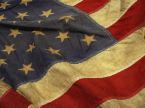
Fun and Games with the Middle East
Each week we become more aware of the unsettling problems in the Middle East, and we wonder how are we going to resolve the crisis. In order to understand how our relationship with that region of the world deteriorated so badly, it might be best to go back to the beginning of America’s relationship with those countries.
It started with our joining the Allied Forces during the Second World War. Before that, for the most part, the Middle East was always in a three-way tug of war, over-lorded by Britain, France and Russia. But Franklin Roosevelt’s policies differed from those Woodrow Wilson had held in the Great War; Roosevelt firmly believed in making the world safe for democracy. And to that end, he was firmly committed to ending his Allied partners’ Colonialism by war’s end.
Iraq’s King Faisal the Second agreed with Roosevelt that the Middle East should be freed of its colonial masters. When Roosevelt publicly stated in 1943, “This will be my criterion for the relations of the United States toward all nations which are now suffering from the evils of greedy minorities, monopolies, aggression and imperialism,” the Arab states cheered.
So Roosevelt sent General Patrick J. Hurley to Iran and Afghanistan, where he would determine how to make them fully independent after the conflict was over. Hurley drew up what is known as the Declaration Regarding Iran; over Averill Harriman’s objections, Roosevelt signed it and presented it to Churchill and Stalin at the Teheran Conference in late ’43. Roosevelt said then, “I was rather thrilled by the idea of using Iran as an example of what we could do by an unselfish American policy.”
The plan was slammed by our own State Department, which in an internal memo called the Declaration a “hysterical, messianic global piece of baloney.”
Then in April of 1945, King Ibn Saud of Saudi Arabia, who had just aligned his country’s oil interests with ours, asked Roosevelt about the Jewish situation in Israel. On April 5, 1945, Roosevelt wrote to Saud, “Your Majesty will recall that during our recent conversation I assured you that I would take no action, in my capacity as Chief Executive, which might prove hostile to the Arab people.” Seven days later, Roosevelt was dead, and American foreign policy toward the Middle East changed forever.
Now, it should be pointed out that at that time, the entire Middle East saw America as their liberators from Colonial rule, much the same way we were seen as having liberated those countries under Nazi rule. England and France couldn’t complain; we were saving them too.
Let’s fast forward to 1953; Eisenhower came into office and Persia had a popularly elected Prime Minister, Dr. Mohammed Mossadegh. Now, Dr, Mossadegh, though an Arab nationalist, was not totally unfriendly to either America or Russia - and we saw that as a problem.
Moreover, Mossadegh nationalized British Petroleum’s holdings in Iran, although his terms were fair. BP would receive 25% of all net profits from the sale of the oil; Iran would guarantee the oil’s safe delivery to the market, the safety of all BP employees in Iran, and the continued employment of their staff. This arrangement wasn’t seen as quite so friendly by England or our government. John Foster Dulles, Eisenhower’s Secretary of State, told the president in June of 1953, “So this is how we get rid of that madman Mossadegh.”
And with that, the CIA’s Kermit Roosevelt, grandson of Theodore Roosevelt, convinced the Shah of Iran to oust his Prime Minister and seize control of his country. The Shah resisted. But uprisings in the streets, riots started by the British and our CIA, forced the Shah to use his army to quell the pseudo-unrest and take control. One thing should not be forgotten: The Shah violated his country’s constitution when he ousted the very popular Mossadegh, and the people of Iran would never forget or forgive that.
Three years later, the next great Arab nationalist, Gamal Nasser of Egypt, ended the 72-year British occupation of his country and nationalized the Suez Canal. This brought on operation Musketeer, named for the three parties that were going to war to win the canal back: England, France and Israel. And yes, they wanted us to join the fight.
Now, Eisenhower didn’t care for Nasser, but a number of things kept him from putting us into the battle. It was an election year; his legal advisors told him that Egypt had the legal right to the canal’s ownership; and Ike thought direct military action against an Arab state would turn Middle Easterners into anti- Americans. So Ike sat it out. Later he called this action “the shortest and possibly silliest war in history.” The battle for the Suez Canal marked the end of both British and French Imperialism there forever, and it aligned Israel with the West.
And it was in that same year, 1956, that a young Saddam Hussein joined the Bath political party. That year Hussein and others tried to overthrow King Faisal the Second, but the coup failed, and Hussein went into exile. Seven years later Hussein would graduate from the College of Law in Cairo. Maybe that’s why Americans hate Saddam Hussein so much: He’s an attorney.
In 1972, back home, Hussein did the same thing in Iraq that Mossadegh had done in Iran with his country’s oil companies; he nationalized them.
So, now the players are all in place. Britain and France have lost their final grasp on their foreign empires due to their defeat at Nasser’s hands in Egypt - in the process, showing the Middle East that wars against the West can be won. Hussein, law degree in hand, nationalizes Iraq’s oil; the Shah is both hated at home and closely aligned with America. And, with Colonialism out of the Middle Eastern picture, Arabs now see themselves as their own masters.
Saudi Arabia, it should be remembered, is a close ally, still clutching Roosevelt’s 1945 letter promising our friendship. More to the point, the Saud family still rules. Here’s where it falls apart. In the late seventies, when the Shah of Iran becomes more an ally of OPEC than of America, we decide we have little more use for him. It’s at precisely that moment that the world finds out about his SAVAK secret police and hears how the Shah has put down violently any threat to his throne. The people of Iran, believing him to be an American puppet and still furious that he threw democracy out of their country, seize our embassy there in 1979 and start the Islamic Fundamentalist Revolution, forever distancing themselves from Western control.
Russia chooses that moment to invade Afghanistan. The ongoing Cold War makes this a problem for us, but we can’t let that become apparent. So we bring deeply religious Arab nationalists into Afghanistan to fight the Godless Russians. One of those ferried into the war is a young Osama Bin Laden.
Now, Russia didn’t really want to get into a pitched battle with Arab nationalists; if it didn’t, however, that region’s alliance with the West might get stronger. If nothing else, Russia wanted Afghanistan as a buffer zone for its southern coast.
Back to Iraq. Livid about the events in Iran, we back Saddam Hussein in his eight-year war with Iran, a battle that originally started over a land dispute for the Shatt al Arab River basin. Then, in March of 1986, Ronald Reagan signs National Security Directive 166, authorizing stepped-up aid for the rebels fighting against the Russians in Afghanistan. Because we have to appear neutral, aid and weapons are funneled to the mujahedeen, the Taliban and Bin Laden’s fighters through the Pakistani intelligence group, the ISI. The directive to the warriors, given along with the monies and war materiel, is this: The rebels are to be convinced that they are justified in waging an Islamic Jihad against the atheistic Russians and destroying the Soviet Union.
And now you know how we knew their battle plans against us so quickly. We simply reread the instructions we gave them when they fought the Russians.
My, what a tangled web we weave.
Here’s the scorecard now. Hussein and Bin Laden both believe that they were responsible for winning their respective wars. Both are heroes in their own countries. The Pakistani ISI and our operatives have a close relationship because of Afghanistan. Then comes Desert Storm, fought because Hussein believed we backed him in his first land grab with Iran and would do the same for the disputed territory in Kuwait. And in Kuwait, Bin Laden is infuriated because the Royal Family denies him the right to protect his home country, opting instead for our protection. And there you have it: The ultimate case of blowback. From Iran, to Hussein to Bin Laden, to the ISI in Pakistan and their friends, the Taliban. And our government knew the whole story quickly, once the attacks happened, because we were there for each and every step in the careers of these nefarious characters.
And the entire house of cards started going up in 1953, when Kermit Roosevelt overthrew the Prime Minister of Iran and Nasser defeated the British and French.
So, why do we have problems in the Middle East today? Because 50 years ago, at the end of the Second World War, they saw America as their liberators from the British, Russians and French. Today they believe that the USA simply moved in to fill the void left by the powers that we helped throw out. And that’s the short history of our problems in the Middle East.
by Ed Wallace
Each week we become more aware of the unsettling problems in the Middle East, and we wonder how are we going to resolve the crisis. In order to understand how our relationship with that region of the world deteriorated so badly, it might be best to go back to the beginning of America’s relationship with those countries.
It started with our joining the Allied Forces during the Second World War. Before that, for the most part, the Middle East was always in a three-way tug of war, over-lorded by Britain, France and Russia. But Franklin Roosevelt’s policies differed from those Woodrow Wilson had held in the Great War; Roosevelt firmly believed in making the world safe for democracy. And to that end, he was firmly committed to ending his Allied partners’ Colonialism by war’s end.
Iraq’s King Faisal the Second agreed with Roosevelt that the Middle East should be freed of its colonial masters. When Roosevelt publicly stated in 1943, “This will be my criterion for the relations of the United States toward all nations which are now suffering from the evils of greedy minorities, monopolies, aggression and imperialism,” the Arab states cheered.
So Roosevelt sent General Patrick J. Hurley to Iran and Afghanistan, where he would determine how to make them fully independent after the conflict was over. Hurley drew up what is known as the Declaration Regarding Iran; over Averill Harriman’s objections, Roosevelt signed it and presented it to Churchill and Stalin at the Teheran Conference in late ’43. Roosevelt said then, “I was rather thrilled by the idea of using Iran as an example of what we could do by an unselfish American policy.”
The plan was slammed by our own State Department, which in an internal memo called the Declaration a “hysterical, messianic global piece of baloney.”
Then in April of 1945, King Ibn Saud of Saudi Arabia, who had just aligned his country’s oil interests with ours, asked Roosevelt about the Jewish situation in Israel. On April 5, 1945, Roosevelt wrote to Saud, “Your Majesty will recall that during our recent conversation I assured you that I would take no action, in my capacity as Chief Executive, which might prove hostile to the Arab people.” Seven days later, Roosevelt was dead, and American foreign policy toward the Middle East changed forever.
Now, it should be pointed out that at that time, the entire Middle East saw America as their liberators from Colonial rule, much the same way we were seen as having liberated those countries under Nazi rule. England and France couldn’t complain; we were saving them too.
Let’s fast forward to 1953; Eisenhower came into office and Persia had a popularly elected Prime Minister, Dr. Mohammed Mossadegh. Now, Dr, Mossadegh, though an Arab nationalist, was not totally unfriendly to either America or Russia - and we saw that as a problem.
Moreover, Mossadegh nationalized British Petroleum’s holdings in Iran, although his terms were fair. BP would receive 25% of all net profits from the sale of the oil; Iran would guarantee the oil’s safe delivery to the market, the safety of all BP employees in Iran, and the continued employment of their staff. This arrangement wasn’t seen as quite so friendly by England or our government. John Foster Dulles, Eisenhower’s Secretary of State, told the president in June of 1953, “So this is how we get rid of that madman Mossadegh.”
And with that, the CIA’s Kermit Roosevelt, grandson of Theodore Roosevelt, convinced the Shah of Iran to oust his Prime Minister and seize control of his country. The Shah resisted. But uprisings in the streets, riots started by the British and our CIA, forced the Shah to use his army to quell the pseudo-unrest and take control. One thing should not be forgotten: The Shah violated his country’s constitution when he ousted the very popular Mossadegh, and the people of Iran would never forget or forgive that.
Three years later, the next great Arab nationalist, Gamal Nasser of Egypt, ended the 72-year British occupation of his country and nationalized the Suez Canal. This brought on operation Musketeer, named for the three parties that were going to war to win the canal back: England, France and Israel. And yes, they wanted us to join the fight.
Now, Eisenhower didn’t care for Nasser, but a number of things kept him from putting us into the battle. It was an election year; his legal advisors told him that Egypt had the legal right to the canal’s ownership; and Ike thought direct military action against an Arab state would turn Middle Easterners into anti- Americans. So Ike sat it out. Later he called this action “the shortest and possibly silliest war in history.” The battle for the Suez Canal marked the end of both British and French Imperialism there forever, and it aligned Israel with the West.
And it was in that same year, 1956, that a young Saddam Hussein joined the Bath political party. That year Hussein and others tried to overthrow King Faisal the Second, but the coup failed, and Hussein went into exile. Seven years later Hussein would graduate from the College of Law in Cairo. Maybe that’s why Americans hate Saddam Hussein so much: He’s an attorney.
In 1972, back home, Hussein did the same thing in Iraq that Mossadegh had done in Iran with his country’s oil companies; he nationalized them.
So, now the players are all in place. Britain and France have lost their final grasp on their foreign empires due to their defeat at Nasser’s hands in Egypt - in the process, showing the Middle East that wars against the West can be won. Hussein, law degree in hand, nationalizes Iraq’s oil; the Shah is both hated at home and closely aligned with America. And, with Colonialism out of the Middle Eastern picture, Arabs now see themselves as their own masters.
Saudi Arabia, it should be remembered, is a close ally, still clutching Roosevelt’s 1945 letter promising our friendship. More to the point, the Saud family still rules. Here’s where it falls apart. In the late seventies, when the Shah of Iran becomes more an ally of OPEC than of America, we decide we have little more use for him. It’s at precisely that moment that the world finds out about his SAVAK secret police and hears how the Shah has put down violently any threat to his throne. The people of Iran, believing him to be an American puppet and still furious that he threw democracy out of their country, seize our embassy there in 1979 and start the Islamic Fundamentalist Revolution, forever distancing themselves from Western control.
Russia chooses that moment to invade Afghanistan. The ongoing Cold War makes this a problem for us, but we can’t let that become apparent. So we bring deeply religious Arab nationalists into Afghanistan to fight the Godless Russians. One of those ferried into the war is a young Osama Bin Laden.
Now, Russia didn’t really want to get into a pitched battle with Arab nationalists; if it didn’t, however, that region’s alliance with the West might get stronger. If nothing else, Russia wanted Afghanistan as a buffer zone for its southern coast.
Back to Iraq. Livid about the events in Iran, we back Saddam Hussein in his eight-year war with Iran, a battle that originally started over a land dispute for the Shatt al Arab River basin. Then, in March of 1986, Ronald Reagan signs National Security Directive 166, authorizing stepped-up aid for the rebels fighting against the Russians in Afghanistan. Because we have to appear neutral, aid and weapons are funneled to the mujahedeen, the Taliban and Bin Laden’s fighters through the Pakistani intelligence group, the ISI. The directive to the warriors, given along with the monies and war materiel, is this: The rebels are to be convinced that they are justified in waging an Islamic Jihad against the atheistic Russians and destroying the Soviet Union.
And now you know how we knew their battle plans against us so quickly. We simply reread the instructions we gave them when they fought the Russians.
My, what a tangled web we weave.
Here’s the scorecard now. Hussein and Bin Laden both believe that they were responsible for winning their respective wars. Both are heroes in their own countries. The Pakistani ISI and our operatives have a close relationship because of Afghanistan. Then comes Desert Storm, fought because Hussein believed we backed him in his first land grab with Iran and would do the same for the disputed territory in Kuwait. And in Kuwait, Bin Laden is infuriated because the Royal Family denies him the right to protect his home country, opting instead for our protection. And there you have it: The ultimate case of blowback. From Iran, to Hussein to Bin Laden, to the ISI in Pakistan and their friends, the Taliban. And our government knew the whole story quickly, once the attacks happened, because we were there for each and every step in the careers of these nefarious characters.
And the entire house of cards started going up in 1953, when Kermit Roosevelt overthrew the Prime Minister of Iran and Nasser defeated the British and French.
So, why do we have problems in the Middle East today? Because 50 years ago, at the end of the Second World War, they saw America as their liberators from the British, Russians and French. Today they believe that the USA simply moved in to fill the void left by the powers that we helped throw out. And that’s the short history of our problems in the Middle East.
by Ed Wallace













No comments:
Post a Comment